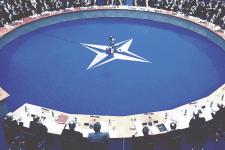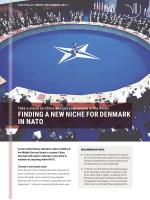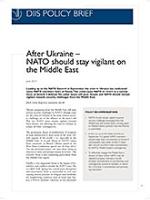Finding a new niche for Denmark in NATO

- To accommodate the US demand for opposition to China, Denmark could focus on limiting Chinese investments in critical infrastructure and standing up to China politically.
- To fill the void left behind international operations, Denmark could seek to develop a new niche within NATO, ideally combining NATO demands with Danish national interests and comparative advantages. A focus on Russia in the Arctic could meet those requirements.
Towards a new Danish niche
Since the end of the Cold War Denmark has been an active contributor to various international operations across the globe. Such missions have played a defining role for the US and NATO, especially since the September 11 attacks, meaning that allies who were willing to make substantial contributions have been in high demand. With the US and NATO gradually beginning to pull back from the greater Middle East, the demand for such operations has fallen.
That does not mean that it has dried up completely, however. An example of this is the current Danish leadership of NATO’s training mission in Iraq (NMI), which has not gone unnoticed in NATO circles in Brussels nor in the US. Nevertheless, such missions appear likely to become rarer, and there are few indicators that such contributions alone will serve to uphold Denmark’s image in Washington and Brussels in the future.
In a recent interview for the Danish news site Altinget the Danish prime minister Mette Frederiksen stressed that, ‘Transatlantic cooperation is the most important [priority] and cannot be challenged in any way. And Europe does not stand in a place between the US and China, we stand unambiguously alongside the US’. This position is likely intended to constitute part of the Danish solution to the US shift. It mirrors NATO’s general shift on China that has taken place over the last few years, not least at US insistence, including accepting a new focus on the role of China in the areas of misinformation, cyber-warfare and the maritime domain.
However, political support for these agendas and for the US in general alone is unlikely to fill the void left from international operations. And neither would likely even a hypothetical Danish naval presence in the Indo-Pacific, which could only be fleeting and symbolic and would likely result in harsh Chinese sanctions. Instead, Denmark needs to develop a new NATO niche, ideally combining national interests, comparative advantages, and international demand. The most obvious way to carve out a role is to increase the focus on Russia closer to home – for example in the Arctic.
The US is leaving the Middle East and turning towards China.
Like the Trump administration before it, the Biden administration perceives China as a long-term strategic challenge that goes beyond a purely military threat. This perception reflects a broad consensus among American foreign policy elites. Consequently, great power competition with China is likely to remain the overarching theme of US foreign and security policy for the foreseeable future.
At the same time, the United States is turning its back on international operations like those in Iraq and Afghanistan. This abandonment of nation-building through international operations enjoys overwhelming support among the American public and, increasingly, also from members of the foreign policy elite. Importantly, counterterrorism operations will continue, but the emphasis will be on so-called ‘over-the-horizon’ capabilities rather than large-scale ground operations.
Implications for NATO and the European NATO countries.
The US preoccupation with China and the abandonment of international operations in the greater Middle East region have profound implications for NATO. If the Alliance is to remain relevant to the United States, it must acknowledge this shift in US foreign and security policy. NATO took the first step in this direction in December 2019 when it mentioned China in a declaration for the first time.
This was followed up in the 2021 Brussels Summit Communiqué, which declares China a strategic challenge and states that NATO ‘will engage China with a view to defending the security interests of the Alliance.’ However, it is widely understood among NATO experts that the Biden administration would have preferred stronger language and would like to see greater European recognition of the threat it believes China poses in both military and non-military terms.*
ANZUS (Australia, New Zealand, United States Security Treaty) is a regional alliance between the US, Australia and New Zealand established in 1951.
AUKUS is a trilateral security partnership between the US, the UK and Australia established in September 2021.
The Quad (The Quadrilateral Security Dialogue) is a strategic dialogue between the US, India, Japan, and Australia. It initially fell apart shortly after exploratory talks between the four countries had been held in 2007. However, the initiative was restarted in 2017.
Broadly speaking, NATO’s European member states are edging closer to the American perception of China, and Europe has adopted a tougher stance. In March 2019 the European Union labelled China an ‘economic competitor’ and a ‘systemic rival’. The main driver behind this development is China, through its actions and coercive ‘wolf warrior diplomacy’, although American pressure is also a factor.
However, significant internal European differences remain, and NATO members still differ on how the Alliance should respond to China. As such, even though European NATO members are increasingly worried about Chinese investments, there are still those, especially in Southern Europe and particularly Portugal and Greece, for whom securing Chinese investments is an important priority.
This lack of political cohesion on China continues to prevent a clear NATO strategy on the issue – especially in the military domain. For this reason, while countries such as the UK, France, and Germany have all sent naval expeditions to Southeast Asia in recent years, it is very unlikely that we will see NATO allies sending military assets to Asia as part of a joint NATO force anytime soon. What we might see is the US increase its focus on regional alliances such as ANZUS, AUKUS, and the QUAD.
A key US concern is also to strengthen NATO’s resilience to malign Chinese interference by rejecting Chinese investments in critical European infrastructure such as port facilities and telecommunications networks. Chinese control over such infrastructure could disrupt NATO’s interoperability. Countering Chinese investments offers European countries little room for ‘scoring points’ with the United States. But failing to do so can result in significant loss of goodwill in Washington.
The United States would also like to see a greater European willingness to confront China politically, e.g. on human rights issues. This is the area where the transatlantic convergence on China has been most profound, as evidenced by the joint US, EU and Canada sanctions against China over its treatment of the Uyghurs. Positioning on China regarding these issues is also likely to play a significant role in US–Danish relations in the future.
We saw this exemplified in the controversy over the construction of airports in Greenland a few years ago, when interest from a Chinese state-owned company triggered US worry and pressure on Denmark, which eventually led to a Danish–Greenlandic deal that kept the Chinese out. Such dynamics are likely to remain important going forward. By rejecting Chinese investment in critical infrastructure and confronting China politically, Denmark can take several non-military actions against China without following the United States to the Indo-Pacific.
In addition, any Danish contributions to building stronger NATO cohesion on China by encouraging greater European unity on how to confront China on economic and political issues would be welcomed in Washington. Denmark’s China policy alone, however, is unlikely to be enough to secure the same kind of close relationship with the US that participation in international operations has hitherto allowed Denmark to have.
Towards a new Danish niche
The pledge made at the NATO summit in Wales committed each of the NATO allies to strive towards spending 2% of GDP on defence in 2024. As of July 2021, a total of ten NATO countries spends 2% or more on defence.
So, what matters in the age of Biden? All-dominating for defence debates during the Trump era, the 2% pledge in NATO is still central to alliance dynamics. However, post-Trump, performance vis-à-vis NATO’s biennial Defence Planning Capability Review is coming increasingly into focus. Denmark fared relatively poorly in October 2020, with the review stressing that until Denmark improved its efforts ‘other Allies may potentially have to pick up part of Denmark’s fair share of the Alliance burden’.
As individual nations have some influence on the type of capabilities that NATO will ask of them, any attempt to combine national and NATO interests and/or to try to develop a niche capability is inherently linked to the NATO capability targets. In this regard, the report stresses the need to see significant Danish improvement within the fields of situational awareness, anti-submarine warfare, as well as the work connected with getting a full-fledged heavy brigade operational for 2032.
While the NATO capability targets for Denmark are not area-specific, all of these capabilities do seem to share a key characteristic, namely that of having ample applicability for use in two regions of growing importance for Danish national interests: the Arctic and the Baltic Sea area.
The biennual review of how individual alliance members live up to previously agreed capability targets.
A prominent example is the investment in domain awareness in the Arctic through the so-called ‘Arctic capability package’, which was confirmed by the Danish parliament in February 2021. Further embracing these priorities going forward might therefore allow the Danish armed forces to square the circle of making national capabilities, US demands and NATO requirements meet.
DIIS Experts





